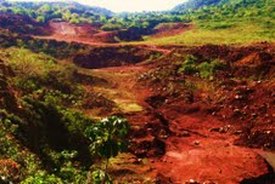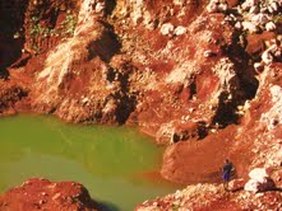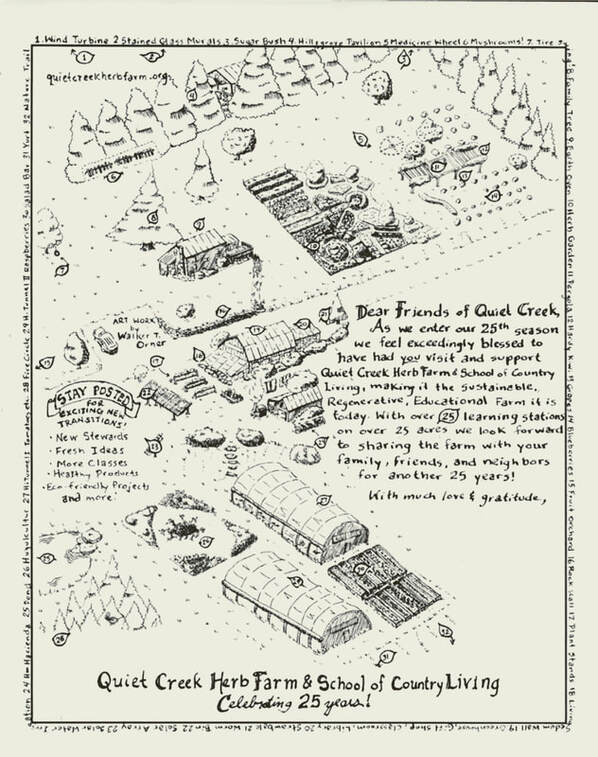Last week Quiet Creek Corner shared how the people of Harmons, Jamaica have been taken advantage of by the bauxite mining company. This community continues to wait for drinking water and be exposed to dangerous, open pits. Harmons appears to Americans as a distant place with a problem that would never to occur in the United States, but the Jamaican situation is quite similar to ours. Could the extraction of a natural resource, with water issues, be replicated in Penn’s Woods?
During the twentieth century, shallow natural gas companies began leasing land from landowners across Pennsylvania. Leasing landowners received a few dollars an acre per year and renewed leases every five years. When the companies drilled for shallow natural gas the landowner reaped royalties and free gas. The shallow gas drilling has caused little to no permanent damage to the land or water. This win-win situation went on without major conflict until a scientist discovered something much deeper a few years ago.
About a mile underneath the land surface, specifically in West Virginia, Pennsylvania, New York and Ohio, is a sedimentary rock called Marcellus Shale. This shale contains trillions of cubic feet of natural gas. Some gas companies renewed leases with landowners; companies considered shallow and deep gas to be the same with no change in the leasing funds. In contrast, other gas companies paid a hundred dollars per acre which easily persuaded some landowners to lease for this higher price. Some landowners, although, held out and leased their land for three thousand dollars an acre. These landowners who waited are called “Shalellioners”.
Shallow gas extraction technique is no longer effective in deep gas reservoirs; hydraulic fracturing is now prescribed. This process involves drilling a mile vertically and then horizontally into the deep gas layer. Various layers of casing and grout occur on the drill hole. When the well is secure, a rod goes downward into the horizontal part of the drilling shaft sending explosives to fracture the shale with millions of gallons of water (pumped out of local rivers), sand and toxic chemicals. This mixture is forced into every little crack in the shale to keep it open for the natural gas to flow back to the surface.
Some of this flowback water (now laden with natural occurring radioactive elements) is pumped out of the well where it is reused in another hydraulic fracturing process, sent to deep injection wells, or evaporated out of holding reservoirs on the drill site. The majority of the flowback water is left in the shale strata and could eventually migrate into layers above, contaminating water to private and public wells and springs.
Now documented, deep gas companies are experiencing problems. Some water wells taste unpleasant and are deemed undrinkable. Livestock die from accidentally spilled hydraulic fracturing water. Methane gas is found in people’s faucet heads; so much that they can light them on fire. Streams supplying high grade trout fishing areas in the vicinity of Marcellus Shale gas wells are found to be bubbling with methane causing fish kills.
On average, a deep gas well nets a profit of ten million dollars. Currently, the landowner is taxed on his/her deep gas leases and royalties.
Deep gas wells are being drilled as you read this. Be aware of what is going on around you, have your water tested immediately, continue testing your water for conductivity, and know your regional contact at PA Department of Environmental Resources, if problems arise.
Contact your local officials with questions; here are a few to begin the discourse. During drought periods are rivers vulnerable to the millions of gallons of water removed for hydraulic fracturing? Over time, will gas well grout and casing disintegrate becoming a conduit for polluted water to migrate into drinking water supplies? Could this contaminated ground water eventually reach the streams, rivers, lakes, and ponds? Shouldn’t the deep gas companies be taxed on their profit? Could truck drivers, who are supposed to take the flow back to deep injection wells open the back valves of their trucks and let the contaminated water spill onto the road? Could they nonchalantly water the roads so to “keep the dust down”? How will the gas transmission infrastructure, where 52 inch diameter pipes must be laid to distribute the Marcellus Shale gas, impact residents?
Isn’t water the life source of Pennsylvania? It certainly is here in Harmons, Jamaica and the residents are still waiting for a consistent supply. Let’s learn from history.
During the twentieth century, shallow natural gas companies began leasing land from landowners across Pennsylvania. Leasing landowners received a few dollars an acre per year and renewed leases every five years. When the companies drilled for shallow natural gas the landowner reaped royalties and free gas. The shallow gas drilling has caused little to no permanent damage to the land or water. This win-win situation went on without major conflict until a scientist discovered something much deeper a few years ago.
About a mile underneath the land surface, specifically in West Virginia, Pennsylvania, New York and Ohio, is a sedimentary rock called Marcellus Shale. This shale contains trillions of cubic feet of natural gas. Some gas companies renewed leases with landowners; companies considered shallow and deep gas to be the same with no change in the leasing funds. In contrast, other gas companies paid a hundred dollars per acre which easily persuaded some landowners to lease for this higher price. Some landowners, although, held out and leased their land for three thousand dollars an acre. These landowners who waited are called “Shalellioners”.
Shallow gas extraction technique is no longer effective in deep gas reservoirs; hydraulic fracturing is now prescribed. This process involves drilling a mile vertically and then horizontally into the deep gas layer. Various layers of casing and grout occur on the drill hole. When the well is secure, a rod goes downward into the horizontal part of the drilling shaft sending explosives to fracture the shale with millions of gallons of water (pumped out of local rivers), sand and toxic chemicals. This mixture is forced into every little crack in the shale to keep it open for the natural gas to flow back to the surface.
Some of this flowback water (now laden with natural occurring radioactive elements) is pumped out of the well where it is reused in another hydraulic fracturing process, sent to deep injection wells, or evaporated out of holding reservoirs on the drill site. The majority of the flowback water is left in the shale strata and could eventually migrate into layers above, contaminating water to private and public wells and springs.
Now documented, deep gas companies are experiencing problems. Some water wells taste unpleasant and are deemed undrinkable. Livestock die from accidentally spilled hydraulic fracturing water. Methane gas is found in people’s faucet heads; so much that they can light them on fire. Streams supplying high grade trout fishing areas in the vicinity of Marcellus Shale gas wells are found to be bubbling with methane causing fish kills.
On average, a deep gas well nets a profit of ten million dollars. Currently, the landowner is taxed on his/her deep gas leases and royalties.
Deep gas wells are being drilled as you read this. Be aware of what is going on around you, have your water tested immediately, continue testing your water for conductivity, and know your regional contact at PA Department of Environmental Resources, if problems arise.
Contact your local officials with questions; here are a few to begin the discourse. During drought periods are rivers vulnerable to the millions of gallons of water removed for hydraulic fracturing? Over time, will gas well grout and casing disintegrate becoming a conduit for polluted water to migrate into drinking water supplies? Could this contaminated ground water eventually reach the streams, rivers, lakes, and ponds? Shouldn’t the deep gas companies be taxed on their profit? Could truck drivers, who are supposed to take the flow back to deep injection wells open the back valves of their trucks and let the contaminated water spill onto the road? Could they nonchalantly water the roads so to “keep the dust down”? How will the gas transmission infrastructure, where 52 inch diameter pipes must be laid to distribute the Marcellus Shale gas, impact residents?
Isn’t water the life source of Pennsylvania? It certainly is here in Harmons, Jamaica and the residents are still waiting for a consistent supply. Let’s learn from history.



 RSS Feed
RSS Feed
